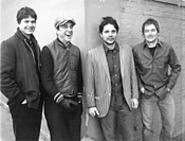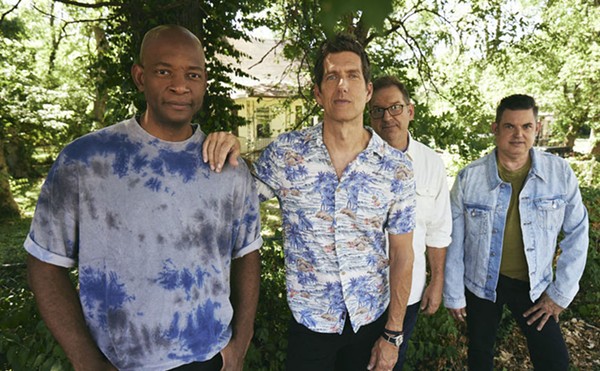Upon hearing Stirratt's words, you may be tempted to sympathize with Reprise, which dropped the band last summer after the powers-that-be deemed Foxtrot "uncommercial." Don't do that. And don't be fooled by Stirratt's comment: Not only can the songs on Foxtrot be described as music, they can be described as sublime music; music that demands and gives in equal measure; music that loves you back. The universe, too, began in chaos.
Hyperbole aside, Foxtrot doesn't quite match the universe as a formal achievement. But it, too, is a thing of shifting parts, nimbly moving with and against each other, in this case guided by the gentle genius of frontman Jeff Tweedy -- a man whose narrow build shoulders certain godlike expectations. Since the 1996 release of Being There, the double album that decisively broke Wilco's ties to the country-punk sound of Tweedy and Stirratt's old band, Uncle Tupelo, Tweedy has emerged as the great American songwriting hope. Being There, and Summerteeth after it, tapped into pop, country, folk, and country traditions, and spun their classic syntaxes into a new language -- aesthetically experimental, but warm and embracing all the same. Tweedy's lyrics performed a similar balancing act: gorgeous melodies voiced bracing, often bleak sentiments, but never lapsed into easy cynicism.
Although Stirratt readily acknowledges that Tweedy is Wilco's prime mover, he insists that the music isn't Tweedy's creation alone -- a popular impression bolstered by the band's revolving lineup. Aside from Tweedy, Stirratt is the only remaining original member. Former Tupelo bandmates Max Johnston and Ken Coomer left after Being There and Summerteeth, respectively -- Coomer not exactly of his own accord (Tweedy had hired another drummer). And Bennett, who was brought in to replace Johnston and wound up exerting considerable influence over Wilco's sound, essentially "drifted out" over the Foxtrot sessions, as Stirratt puts it. Bennett's reasons remain somewhat unclear, though in this instance, the old chestnut "creative differences" seems accurate.
"I think Jay wasn't able to deal with the abstract nature of what we were talking about," Stirratt suggests. "He ventured more and more toward the engineering side of things and took himself out of the music. I never understood why. I mean, a lot what we were doing was just collecting sounds, and I guess that wasn't his forte. Like I said, too abstract."
Yet Stirratt invokes that very "abstract" process as proof that Wilco is a collaboration, not some euphemistically named solo effort.
"The word I like to use is 'consortium.' Obviously, Jeff does so much -- but the palette surrounding him comes out of all of us working together," Stirratt explains. "We'd have these all-night noise sessions, each of us assembling a chain of effects, taking turns putting together different parts of a song. That was the heart of the experimentation. Like 'Hot in the Poor Places' -- the basic track is Jeff, with Jay contributing a bit early on. Then we tried different things with it -- that song probably got 'done' three or four times. And the original vocal take survived intact, but all that stuff around it -- the shortwave radio, whatever -- I don't think Jeff could have done that alone."
Parsing through the material from over a year's worth of open-ended sessions emerged as the band's biggest challenge. Stumped, they turned to producing maestro and Chicago scenester Jim O'Rourke, who'd made gorgeous sense of Stereolab's multilayered soundscapes and Sonic Youth's roiling dissonance in the past. O'Rourke gamely rose to the task of mixing down the 55 reels of tape Wilco handed him into one coherent album.
"Jim was absolutely pivotal," Stirratt declares, still sounding a bit awed. "I could play you mixes before Jim and after Jim, and I mean, he shaped that record. He gave it its sound. But it's interesting. I think a lot of people will think that Jim took our stuff and made it weird, when really, he drew out the melodies, brought everything into focus, and made it more conventional."
Not conventional enough for the folks at Reprise, however. Songs straining urgently toward uplift only to be cut short by a clatter of noise, or acoustic folk submerged in the whirr of static, don't make good singles, apparently; thus a firestorm was set in motion. Judging by the media's outraged and outsized coverage of it, you'd think a good band had never been dropped before Reprise pink-slipped Wilco. The band found itself starring in a crucifixion drama in which the facts felt curiously miscast -- particularly that 30 labels were begging for the opportunity to release Foxtrot, and that the band itself had found an innovative way to get the music out to its public by streaming it on its website.
"Knowing that we were being dropped wasn't a big deal for us," Stirratt says. "It was like 'Oh, you don't like this record? Well, you didn't like the last one, either.' Big news. We knew we had this touring base, we knew we'd get the record out, we knew we weren't going to starve. So it was weird to become this cause célèbre."
Weird, perhaps, but understandable, especially by dint of timing. When September 11 happened, Foxtrot's inward-looking meditation on America took on a haunting prescience, and Tweedy's trademark subversion of the familiar on songs like "Ashes of American Flags" and "Radio Cure," and his plaints for solace in a disjointed world, resonated more than anyone could have expected. America needed Wilco. And we still do.












